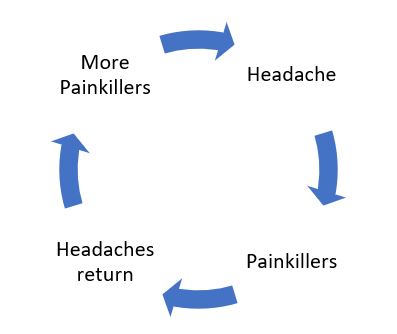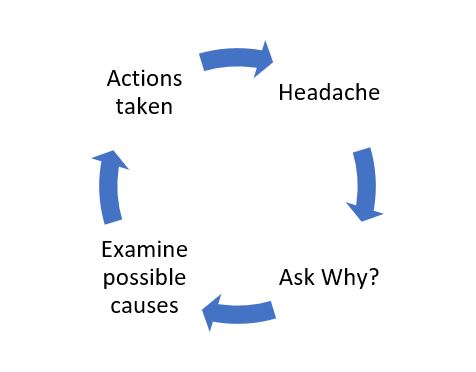Here’s a sneaky way our ego hurts us: It’s impatient. Our identity likes to find quick fixes for our problems. Far from effective in the long-term, quick fixes often fail and leave you worse off than before. In fact, Fixes that Fail is the name of a general pattern, or archetype formally discussed in the field of systems thinking. Fixes that Fail describes and analyzes situations where short-term fixes produce long-term negative outcomes.
Below we’ll analyze two scenarios where understanding the Fixes that Fail archetype can keep us from self-sabotage and start making lasting positive change in our lives.
Fix that Fails: Headaches

Let’s take the example of headaches. A dull ache becomes painful to the point that you can’t think straight. Wanting no more than to rid yourself of the pain, you take a painkiller. The pain subsides and you get back to your happy life. The headache returns another day. Having had success with the painkillers last time, you take them again. Again, the drugs numb the sensations that are signaling pain and you go about our day. Popping pills becomes the go-to for as long as they make the pain go away.
Here’s what’s happening outside of your awareness: The headache is your body’s way of telling your conscious mind that something is out of balance with your health. The painkillers are chemically cutting off that signal to your brain. If you indulge in this ignorance bliss for too long, your body begins adapting to the painkilling medication. This may entice you to increase the dosage or seek stronger meds in order to find relief from your headaches. Yet if your headaches return again and again for as long as you opt for the quick fix, you’ll never know why. Over time, the painkillers might lose their effect entirely. In this case, you’ll go back to square one, except you may also be suffering from the side effects of prolonged overuse of the medication (look up the potential side effects of the medications you are taking. They’re not pretty.) Worse still, you could become addicted to painkillers (a rising trend in recent years).
A Better Approach

When you get a headache, stop for a moment and consider what it REALLY is – a signal that something in your body is out of balance. Recognizing that pain is your body’s way of telling you something’s wrong is one of the first steps to optimal health. Instead of covering the sign, why don’t you listen to it? At first, you may not know why you have a headache but you should be trying to find out. Ask yourself:
- Did I drink enough water today?
- How did I sleep?
- Am I stressed out?
- Is poor posture or excessive muscle tension bringing on the headache?
Most people don’t drink enough water, are sleep deprived, are stressed, and carry tension in the neck and upper back muscles. All of these physical states can lead to headaches. Or the cause of the head could be coming from something else, but if you take an inquisitive attitude about your health, you’ll be more likely to solve your problems.
Conclusion
By forming the right questions, you’ll be better prepared to address each of the suspect areas. Still don’t notice any changes? You may be dealing with something more serious. If so, get advice from someone who knows more than you about your condition. We can certainly use medicines to numb pain. However, if you are to truly understand what’s really going on, numbing the pain isn’t going to help you get to the root of the problem. It will only blind you to it.
What other examples of health-related fixes that fail can you think of?




